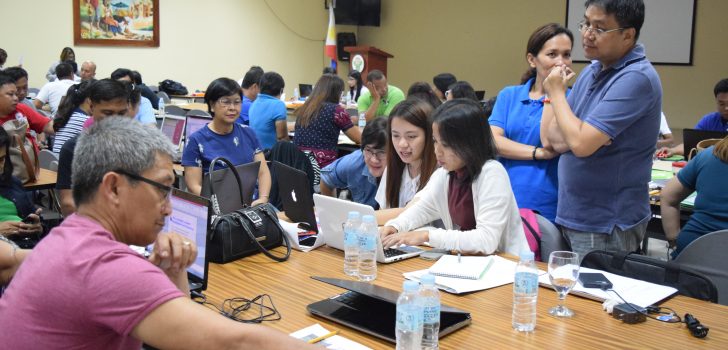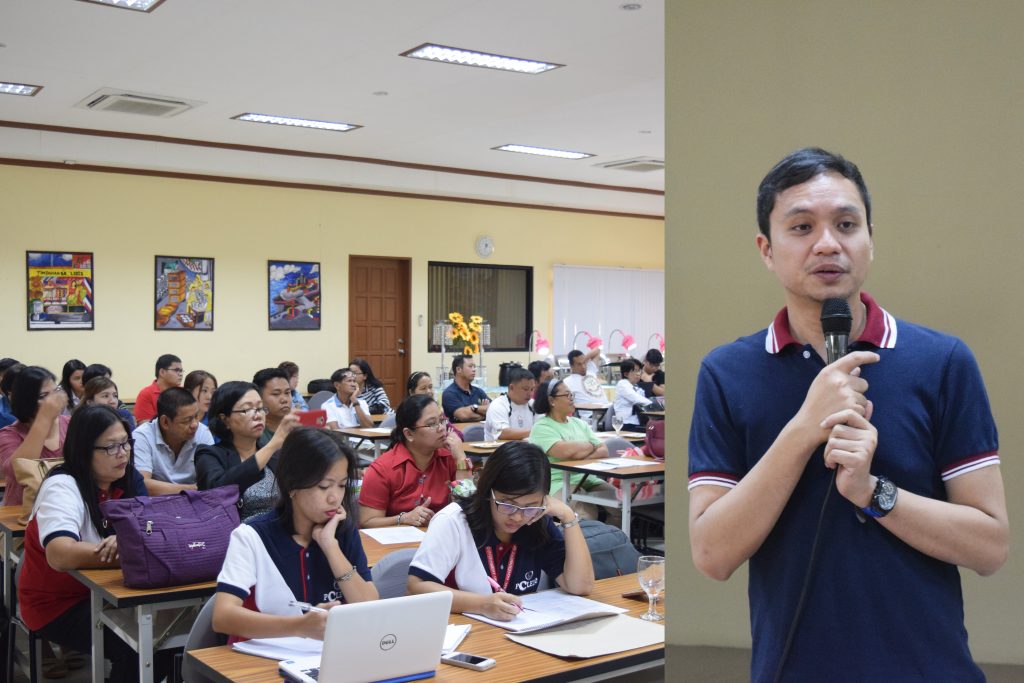 PRDP CALABARZON RPCO I-REAP Business Development Officer Julienne Dimaculangan and staff from the provincial LGU coach the members of Aga Farmers Multi-purpose Cooperative in their business plan preparation.
PRDP CALABARZON RPCO I-REAP Business Development Officer Julienne Dimaculangan and staff from the provincial LGU coach the members of Aga Farmers Multi-purpose Cooperative in their business plan preparation. PRDP ensures enterprise subprojects’ viability through business planning workshop
“Hindi biro ang pagpasok sa isang negosyo. Dapat alam natin ang pasikot-sikot nito lalo na sa kagaya namin na ngayon pa lang mag-uumpisa. (Venturing into a business is not a joke. Understanding every part of it is a must especially for us who are just starting.)”
This is how Nilo Barrameda, president of Samahan ng Mangingisda at Magsi-seaweeds ng Villa San Isidro (SMMVSI), described his learnings from the business planning workshop conducted in Batangas last March 13–16.
Barrameda’s group proposes a subproject on seaweeds production and marketing. The SMMVSI is one of the nine associations and cooperatives from Batangas, Laguna, and Quezon preparing proposals under the enterprise development (I-REAP) component of the PRDP.
The 44-year old seaweeds grower from Calauag, Quezon believed that engaging in business is one way for his group and their families to prosper. Without proper planning, their plans might not come into fruition. They were thankful, however, that their vision will prosper as they now learn more about the PRDP’s tools and processes.
To ensure that all proposals are feasible and sustainable, PRDP requires proponent groups to submit business plans for their business ventures.
“We want to make sure that every peso we invest in these groups will reap and contribute to the development in the countryside. One way of ensuring this is to look for the enterprise viability through business plans,” CALABARZON RPCO I-REAP Component Head Editha Salvosa said.

PRDP South Luzon PSO Director Shandy Hubilla (right) explains the significance of the participation of cooperatives and associations in the preparation of business plans. Proponent groups from Batangas, Laguna, and Quezon participated in the business planning workshop facilitated by the PRDP CALABARZON RPCO.
With the help of the concerned LGUs and the components and units of PRDP, the workshop aims to fast-track the preparation of I-REAP proposals from different proponent groups. The I-REAP component intends to present the said proposals to the Regional Project Advisory Board (RPAB) before the next World Bank implementation support mission in May.
Aside from financial analysis, the business plan also includes social, environmental, and market analyses. This guarantees the group that their plan is financially, socially and environmentally sound.
The Batangas Dairy Cooperative (BADACO) already realized the benefits of having a business plan when their existing dairy processing facility was funded by another government agency which required a business plan.
“Dito mo kasi p’wedeng makita ang mga projection mo kung gaano kalaki ang kikitain makalipas ang ilang taon, kung magkano dapat ang presyo o kaya gastusin mo para may profit ang negosyo mo ([Through the business plan] we can see the projection on how your profit will increase after certain number of years, and how much should the price and expenses be for your enterprise to profit),” BADACO treasurer Cesar Almarez said.
BADACO’s proposal is the expansion of their milk processing business through stock infusion and forage development. Since there are other groups and private companies in the region that process milk products, the cooperative needs to make their products and services stand out from other competitors. The business planning process can help them set clear targets and monitor every step of their enterprise.
The participating local government units (LGUs) were also inspired to help their respective proponent groups in crafting their business plans. Seeing the potential of the seaweeds industry in the Province of Quezon, Pamela Nilo of the Provincial LGU was motivated to assist Calauag’s seaweeds association. She is one of the LGU staff who helps proponent groups in writing their business plans.
Nilo also noted that while the business plan is a requirement for PRDP, the benefits of knowing how to prepare the document extend further. “The skills we learned from this activity will be useful for other government and civic projects requiring business plans,” Nilo said. She added that they can now help more people in rural areas in planning viable businesses.
The subproject proposals presented during the workshop will support priority commodities such as seaweeds, dairy cattle, coffee, and cacao. ### (Lawrence Albert A. Bariring, CALABARZON RPCO InfoACE Unit)
